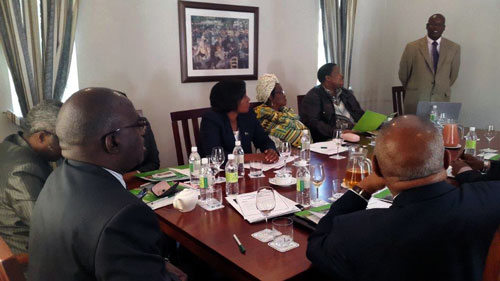
Peter Setimela, senior seed system specialist at the CIMMYT-Southern Africa Regional Office (CIMMYT-SARO), made a presentation to regional ambassadors on CIMMYT’s work helping to achieve food security in southern Africa, during a meeting organized by the Botswana Embassy on 27 July in Harare, Zimbabwe.
The meeting brought together ambassadors from 13 countries (Angola, Botswana, Democratic Republic of Congo, Lesotho, Madagascar, Malawi, Mauritius, Mozambique, Namibia, Seychelles, South Africa, Swaziland, Tanzania, Zambia, and Zimbabwe) that make up the Southern African Development Community (SADC). At a time when the SADC region is grappling with acute maize deficits, the ambassadors invited CIMMYT to highlight its work on stress tolerant maize, as well as on maize biofortified with pro-vitamin A and quality protein maize, which could contribute to reducing malnutrition in the region.
Maize production in southern Africa is the lowest in the world, yet its food security is highly dependent on maize. The region has a maize deficit, with only Zambia recording a surplus during the current agricultural season. While all countries had a bumper harvest last season, South Africa recorded a 33% reduction this season, with reports indicating it will import up to 900,000 tonnes of maize to supplement this year’s harvest. Zambia has been the source market for maize in the past three years, but this year, the country was affected by low rainfall and is expecting reduced maize output, although there is still a surplus.
In his presentation, Setimela highlighted the food security challenges SADC will face in coming years, and recommended urgent action. “We need to reduce poverty and improve nutrition by promoting climate-resilient and nutritious maize.” He also recommended taking steps to improve farmers’ agricultural practices, such as conservation agriculture, as well as their decision- making in crop production and marketing, and giving them opportunities for value-addition.
He emphasized that CIMMYT is working to help farmers cope with drought and climate change, and pointed out that “developing drought tolerant maize will become more critical, especially now that most countries in the region are being affected by the negative effects of drought or, in some cases, flooding.” Food scarcity and unpredictable changes in food availability in SADC are also due to the scourge of HIV and AIDS.
Setimela ended his presentation by urging the ambassadors to support their national research systems to work in partnership with private seed companies and non-governmental organizations on producing stress and drought tolerant maize varieties.
Over the years, the agricultural sector in SADC has become less attractive to investors and has been relegated behind other economic sectors such as mining and manufacturing. Nonetheless, broad-based agricultural research and development has strong potential to drive economic growth, reduce poverty, and improve food security and nutrition.
 Climate adaptation and mitigation
Climate adaptation and mitigation 
